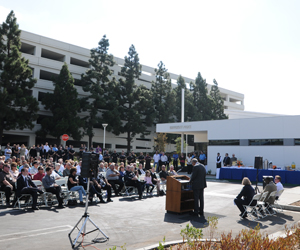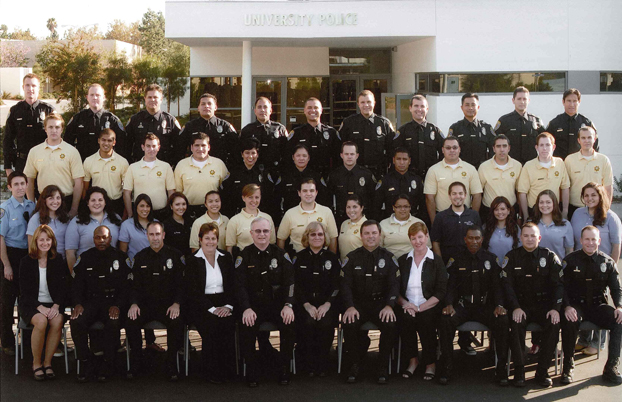 Caption: Chief Judi King, at center, front row, is pictured with her staff and officers in this 2009 departmental photograph.
Caption: Chief Judi King, at center, front row, is pictured with her staff and officers in this 2009 departmental photograph.
From Campus to Cattle Ranch
First Female CSU Police Chief Judith D. King Retires
Before Judith D. King became the university’s chief law enforcement official, the men and women who staffed campus security operations were called public safety officers and not police. She quickly changed the department name to reflect the professional law enforcement operation she managed.
On her watch, King saw the CSUF force become the first in the CSU to be accredited by the Commission on Accreditation for Law Enforcement Agencies. She also oversaw the construction of a modern police facility with a dedicated emergency operations center, secure parking for police vehicles and essential facilities for weapons, evidence and interviews and the expansion in the numbers of sworn officers.
With a focus on safety and security, she has emphasized the need for emergency training, not only for her officers but also faculty, staff and students, as well as general safety training to students in housing, Greek organization and campus clubs.
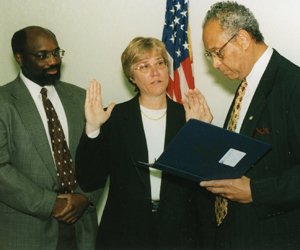 Caption: President Milton A. Gordon, right, administered the oath of office to incoming University Police Chief Judi King May 17, 1999. At left is Willie Hagan, vice president for administration. Photo by Michael Riley
Caption: President Milton A. Gordon, right, administered the oath of office to incoming University Police Chief Judi King May 17, 1999. At left is Willie Hagan, vice president for administration. Photo by Michael Riley
Now, the first female chief in the CSU system is retiring, and moving to her 200-acre ranch in central California with her husband, Cal State Los Angeles Police Chief Gregory King, who also is retiring.
“We will be working with horses and teaching our grandchildren to ride and take part in junior rodeo,” King says with pride. Her sons have relocated to the working ranch where they hope to have cattle soon. “There's a lot to do.”
King became a Virginia police officer in 1979, moving up to the rank of sergeant before moving to California in 1995. "When I started, it wasn’t too common to be a female in law enforcement,” she remembers.
Despite feeling that she was the “token” female, she moved up the ranks during 15 years in Virginia, serving as a patrol officer and a sergeant.
“Working seven-day rotating shifts in patrol was difficult with my young children,” King says of those times. “They had to make a lot of sacrifices and we rarely had normal holiday celebrations because I always had to work. My children learned to adapt at an early age.”
When King moved to California, she tried her hand in a different arena — a university campus. She was hired as the assistant director of public safety at Cal State Long Beach. In that position, King managed uniform patrol, community services, investigations, communications and records. She also helmed special-event staffing and risk assessment, served as liaison with neighboring police jurisdictions and communities, and managed internal affairs.
“Having a female in that role was a tough decision for the search committee panel, but then-Chief Jack Pearson believed in me,” she says. “It gave me many opportunities to learn about a university campus in the CSU.
“Working at Long Beach, I quickly learned that policing on a college campus was pretty much the same as working in a small city. University policing is the truest form of community policing,” King explains. “The main difference was learning the organizational structure and adapting to the change in student population every year.”
Two years into working at Long Beach, King says she knew she wanted to be a chief of police.
“I have always been very competitive, both in sports and in my professional career,” she notes. “My mother always told me that I could do anything I set my mind to, and after getting involved in accreditation and traveling to many other departments throughout the country, I decided I wanted to have an opportunity to utilize the knowledge I had gained to bring about positive changes in a police department.”
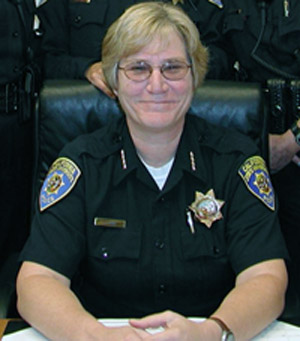 Caption: Police Chief Judi King
Caption: Police Chief Judi King
In 1999, King did just that. She became CSUF’s police chief, overseeing a force of 14 officers and a budget of approximately $1.1 million. The campus police force now has 24 sworn officers who patrol the campus and the surrounding neighborhoods, working with the police forces in the communities around the campus. Most of the crimes seen on campus are property crimes, including thefts from vehicles and buildings, and overall crime is low, according to King. Nevertheless, she has maintained a well-trained force, prepared for whatever can happen in a community.
“We don’t have a closed campus where we monitor who goes in and out. We aren’t surrounded by fences. This is an open and free space for a purpose. If we were to change that, we may be in danger of defeating everything we stand for,” said the chief following Sept. 11. “We want faculty, staff and students to be aware, just as they would if they were at home, and we want them to know what to do if there was a crisis on campus.”
Looking back over her 12 years on campus, King says it is the best place that she’s ever worked in her career.
“I have had a very supportive boss in Vice President Willie Hagan, and President Gordon has always understood the importance of the work we do,” she says. “I am very proud of the fact that our officers are viewed as peers with the officers at surrounding police departments. It was not always the case in the past. We have some quality people working at this department and it is nice that they have finally received recognition of this fact.
Every year, King speaks to a class taught by Jill Rosenbaum, professor of criminal justice, about the changes that she has seen over her 40-plus career in law enforcement. “Because women like me succeeded, it has made it easier for those who follow,” King says.
And during her long career in law enforcement, women's roles in law enforcement have changed for the better.
“Female police officers are now seen as an asset at most police departments. They have the ability to identify better with female victims and also have a tendency to have strong communication skills, which works well in community policing arenas,” she explains. “Many qualified female officers are now starting to move up in the ranks and they are being accepted by their peers without any reservations.”
What happens now for University Police? King believes that the police department will continue to serve and meet the needs of the campus community.
“University Police enjoys very strong campus support,” she says. “The department will continue to evolve to meet the growing needs of the university that it serves, and adapt to meet the changes that accompany the growing residential population on campus. And there will be a lot of technology helping the force do the job.”
King is convinced that there is “no way that the department will be stagnant. It will move forward, retaining its professional edge by adapting to changing campus conditions."
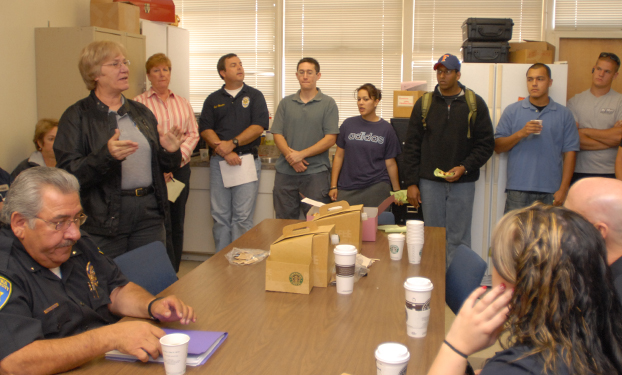 Caption: Chief Judi King discusses operational goals during a meeting with staff, officers and campus observers prior to an April 2008 active shooter drill on campus. Situational drills and campuswide evacuation and shelter-in-place exercises were instituted on an annual basis under King's command. Photo by Kelly Lacefield
Caption: Chief Judi King discusses operational goals during a meeting with staff, officers and campus observers prior to an April 2008 active shooter drill on campus. Situational drills and campuswide evacuation and shelter-in-place exercises were instituted on an annual basis under King's command. Photo by Kelly Lacefield
July 5, 2011
